| Listing 1 - 7 of 7 |
Sort by
|
Book
ISBN: 0748609016 Year: 1997 Publisher: Edinburgh Edinburgh University Press
Abstract | Keywords | Export | Availability | Bookmark
 Loading...
Loading...Choose an application
- Reference Manager
- EndNote
- RefWorks (Direct export to RefWorks)
Natural theology --- Metaphysics --- Thomas Aquinas --- Contributions in philosophical theology --- Philosophical theology --- History of doctrines --- Middle Ages, 600-1500 --- God --- Proof --- Middle Ages, 500-1500
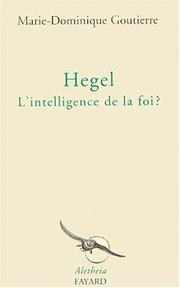
ISBN: 2213599831 9782213599830 Year: 1997 Volume: *1 Publisher: Paris Fayard
Abstract | Keywords | Export | Availability | Bookmark
 Loading...
Loading...Choose an application
- Reference Manager
- EndNote
- RefWorks (Direct export to RefWorks)
Religious studies --- Hegel, Georg W.F. --- Hegel, Georg Wilhelm Friedrich, --- Religion --- Hegel, Georg Wilhelm Friedrich --- Contributions in philosophical theology --- Philosophical theology --- History --- 19th century --- Hegel, Georg Wilhelm Friedrich, - 1770-1831 - Religion --- Hegel, Georg Wilhelm Friedrich, - 1770-1831
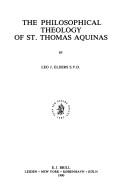
ISBN: 9004091564 9789004091566 9789004452404 Year: 1990 Volume: 26 Publisher: Leiden Brill
Abstract | Keywords | Export | Availability | Bookmark
 Loading...
Loading...Choose an application
- Reference Manager
- EndNote
- RefWorks (Direct export to RefWorks)
The philosophical theology of St. Thomas Aquinas is the crowning piece of his metaphysics. Leo J. Elders studies it against the background of the attempts of the great philoso- phers of the past to penetrate deeper into the knowledge of God. While the Introduction treats the nature of philosophical theology according to Aquinas, Chapter One presents a concise history of the idea of God in Western philosophical thinking. Chapters Two and Three deal with the question of the cognoscibility of God and the Five Ways of St. Thomas. New solutions are proposed of some difficulties in the Third and Fourth Ways. The attributes of God are studied in the order of the Summa theologiae I . Chapter Seven considers the grammar of God-language. The following chapters examine divine knowledge, foreknowledge of future events, divine will and providence as well as creation. The last chapter deals with the problem of the co-existence of God and finite creatures. This study shows that the philosophical theology of St. Thomas Aquinas is a coherent whole of impressive depth and beauty. It has its basis in our daily experience of the world and the general principles of being, but its conclusions reach the summits of negative theology.
Philosophical theology --- Théologie philosophique --- History of doctrines --- Histoire des doctrines --- 600-1500 (Moyen Age) --- Thomas, --- Contributions in philosophical theology --- Et la théologie philosophique --- History --- 2 THOMAS AQUINAS --- -#GROL:SEMI-1-05'12' Thom --- Theology, Philosophical --- Philosophy and religion --- Theology, Doctrinal --- Godsdienst. Theologie--THOMAS AQUINAS --- -Thomas Aquinas, Saint --- -Contributions in philosophical theology --- 2 THOMAS AQUINAS Godsdienst. Theologie--THOMAS AQUINAS --- Théologie philosophique --- Et la théologie philosophique --- #GROL:SEMI-1-05'12' Thom --- Akʻvineli, Tʻoma, --- Akvinietis, Tomas, --- Akvinskiĭ, Foma, --- Aquinas, --- Aquinas, Thomas, --- Foma, --- Thomas Aquinas, --- Tʻoma, --- Toma, --- Tomas, --- Tomasu, --- Tomasu, Akwinasu, --- Tomasz, --- Tommaso, --- Tʻovma, --- Тома, Аквінський, --- תומאס, --- תומס, --- اكويني ، توما --- Middle Ages, 600-1500 --- Thomas Aquinas --- Philosophical theology - History of doctrines - Middle Ages, 600-1500. --- Thomas, Aquinas, Saint, 1225?-1274 - Contributions in philosophical theology. --- Contributions in philosophical theology. --- Middle Ages, 500-1500 --- Ākvīnās, Tūmās, --- اكويني، توما, --- آکويناس، توماس, --- Philosophical theology - History - To 1500. --- Philosophical Theology --- History of Doctrines
Book
ISBN: 2901104290 2821836899 9782901104292 Year: 1991 Volume: 29 Publisher: Aix-en-Provence CUERMA
Abstract | Keywords | Export | Availability | Bookmark
 Loading...
Loading...Choose an application
- Reference Manager
- EndNote
- RefWorks (Direct export to RefWorks)
Patrology --- Medieval Latin literature --- Christian dogmatics --- Thomas Aquinas --- William of Saint-Amour --- Paris --- History --- Philosophy --- Guillaume --- Thomas, --- -Philosophy, Medieval --- Medieval philosophy --- Scholasticism --- Annals --- Auxiliary sciences of history --- Guillaume de Saint-Amour --- Thomas Aquinas, Saint --- -Contributions in philosophical theology --- -Guilielmus de S. Amore --- Guillelmus de Sancto Amore --- Contributions in philosophical theology --- Philosophy, Medieval --- History, Modern --- Guillaume, --- Akʻvineli, Tʻoma, --- Akvinietis, Tomas, --- Akvinskiĭ, Foma, --- Aquinas, --- Aquinas, Thomas, --- Foma, --- Thomas Aquinas, --- Tʻoma, --- Toma, --- Tomas, --- Tomasu, --- Tomasu, Akwinasu, --- Tomasz, --- Tommaso, --- Tʻovma, --- Тома, Аквінський, --- תומאס, --- תומס, --- اكويني ، توما --- Guillaume de Saint-Amour, --- Gulielmus, --- William, --- Ākvīnās, Tūmās, --- اكويني، توما, --- آکويناس، توماس, --- History - Philosophy --- Guillaume, - de Saint-Amour, - 1202?-1272 --- Thomas, - Aquinas, Saint, - 1225?-1274 --- scolastique --- théologie --- thomisme
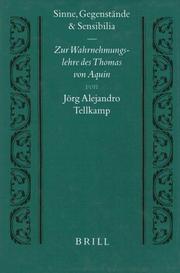
ISSN: 01698125 ISBN: 9004114106 9004452834 9789004114104 9789004452831 Year: 1999 Volume: 66 Publisher: Leiden Brill
Abstract | Keywords | Export | Availability | Bookmark
 Loading...
Loading...Choose an application
- Reference Manager
- EndNote
- RefWorks (Direct export to RefWorks)
Thomas Aquinas' theory of knowledge has mainly been studied from the point of view of his theory of intellect. However, one of the constituent elements of such a theory has been widely neglected: perception. This work tries to disentangle the different aspects of Aquinas' theory. First, the causes of perception are looked at, including analyses on the physics of perception. Secondly, the psychology of perceptual knowledge and the theory of sensibles are explored, and thirdly, the importance of the perceptual apparatus is sketched by stressing the role of the outer and inner senses in the process of the acquisition of perceptual knowledge. In order to give a comprehensive account of his theory, three main aspects are taken into account.
Perceptie (Filosofie) --- Perception (Philosophie) --- Perception (Philosophy) --- Waarneming (Filosofie) --- Thomas, --- Contributions in philosophy of perception. --- 1 THOMAS AQUINAS --- Philosophy --- Filosofie. Psychologie--THOMAS AQUINAS --- Thomas Aquinas, Saint --- -Contributions in philosophical theology --- 1 THOMAS AQUINAS Filosofie. Psychologie--THOMAS AQUINAS --- Perception (Philosophy). --- Akʻvineli, Tʻoma, --- Akvinietis, Tomas, --- Akvinskiĭ, Foma, --- Aquinas, --- Aquinas, Thomas, --- Foma, --- Thomas Aquinas, --- Tʻoma, --- Toma, --- Tomas, --- Tomasu, --- Tomasu, Akwinasu, --- Tomasz, --- Tommaso, --- Tʻovma, --- Тома, Аквінський, --- תומאס, --- תומס, --- اكويني ، توما --- Thomas Aquinas --- Contributions in philosophy of perception --- Ākvīnās, Tūmās, --- اكويني، توما, --- آکويناس، توماس, --- Christian philosophers
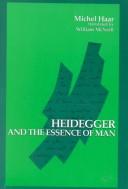
ISBN: 0791415554 9780791415559 Year: 1993 Publisher: Albany State university of New York press
Abstract | Keywords | Export | Availability | Bookmark
 Loading...
Loading...Choose an application
- Reference Manager
- EndNote
- RefWorks (Direct export to RefWorks)
Philosophical anthropology --- History --- Heidegger, Martin, --- -Anthropology, Philosophical --- Man (Philosophy) --- Civilization --- Life --- Ontology --- Humanism --- Persons --- Philosophy of mind --- -Philosophy --- Heidegger, Martin --- -Heidegger, Martin --- -Contributions in philosophical theology --- Contributions in philosophical anthropology --- -History --- Khaĭdegger, Martin, --- Haĭdegger, Martin, --- Hīdajar, Mārtin, --- Hai-te-ko, --- Haidegŏ, --- Chaitenger, Martinos, --- Chaitenker, Martinos, --- Chaintenger, Martin, --- Khaĭdeger, Martin, --- Hai-te-ko-erh, --- Haideger, Marṭinn, --- Heidegger, M. --- Haideger, Martin, --- Hajdeger, Martin, --- הייגדר, מרתין --- היידגר, מרטין --- היידגר, מרטין, --- 海德格尔, --- Chaintenker, Martin, --- Hāydigir, Mārtīn, --- Hīdigir, Mārtīn, --- هاىدگر, مارتين, --- هىدگر, مارتين, --- Philosophical anthropology - History - 20th century --- Heidegger, Martin, - 1889-1976
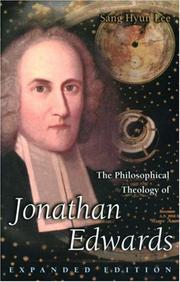
ISBN: 0691073252 Year: 1988 Publisher: Princeton (N.J.): Princeton university press
Abstract | Keywords | Export | Availability | Bookmark
 Loading...
Loading...Choose an application
- Reference Manager
- EndNote
- RefWorks (Direct export to RefWorks)
This book demonstrates the originality and coherence of Jonathan Edwards' philosophical theology using his dynamic reconception of reality as the interpretive key. The author argues that what underlies Edwards' writings is a radical shift from the traditional Western metaphysics of substance and form to a new conception of the world as a network of dispositions: active and abiding principles that possess reality apart from their manifestations in actions and events. Edwards' dispositional ontology enables him to restate the Augustinian-Calvinist tradition in theology in a strikingly modern philosophical framework. A prime example of Edwards' innovative reconstruction in philosophical theology is his conception of God as both eternal actuality and a disposition to repeat that actuality within God and also through creation. This view is a compelling alternative to the traditional Western doctrine of God as changeless actuality, on the one hand, and the recent process theologians' excessive stress on God's involvement in change, on the other. Edwards' achievement was that he saw dynamic movement as essential to God's own life without compromising the traditional Christian tenets of God's prior actuality and transcendence. The author of this volume also explicates the way in which Edwards' dynamic reconception of reality informs his theories of imagination, aesthetic perception, the knowledge of God, and the meaning of history. This expanded edition includes a new preface and a new appendix titled "Jonathan Edwards on Nature."
Philosophical theology --- History --- Edwards, Jonathan, --- Contributions in philosophical theology. --- Abrams, M. H. --- Addison, Joseph. --- Aristotle. --- Barth, Karl. --- Berkeley, George. --- Boyd, Gregory. --- Calvin, John. --- Carse, James. --- Clarke, Samuel. --- Fall of humankind. --- Flavel, John. --- Grean, Stanley. --- Grene, Marjorie. --- Gruenler, Royce G. --- Hartshorne, Charles. --- Holy Spirit. --- Hutton, James. --- James, William. --- Jüngel, Eberhard. --- Kant, Immanuel. --- Klaaren, Eugene M. --- Kuklick, Bruce. --- Lee, Sang Hyun. --- Loux, Michael J. --- Lovejoy, Arthur. --- Maritain, Jacques. --- McMullin, Ernan. --- Miller, Perry. --- Neoplatonism. --- Northampton. --- Owen, John. --- Spinoza. --- Trinity. --- White, Morton. --- Willey, Basil. --- Wordsworth, William. --- Yale College. --- conversion. --- deism. --- dispositional ontology. --- emanation. --- idealism. --- imagination. --- mysticism. --- occasionalism. --- pantheism. --- plastic natures. --- pragmatist. --- process theology. --- romanticism. --- substance. --- voluntarist tradition.
| Listing 1 - 7 of 7 |
Sort by
|

 Search
Search Feedback
Feedback About UniCat
About UniCat  Help
Help News
News